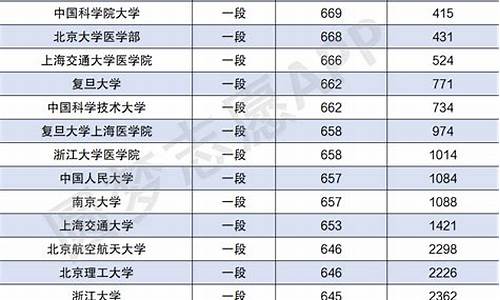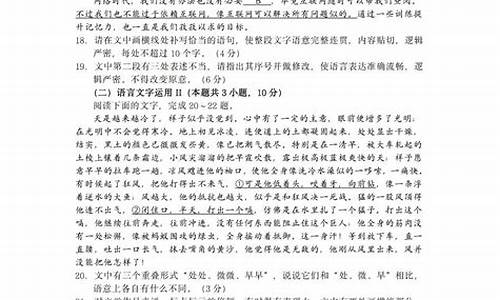您现在的位置是: 首页 > 教育科技 教育科技
高考介词和介词短语,高考介词和介词短语大全
tamoadmin 2024-06-01 人已围观
简介1.英语介词短语大全2.英语介词的用法3.什么是介词?介词有哪些?4.高中英语的短语中to是介词的有哪些5.英语的短语介词6.介词短语有哪些?表示时间的介词称为时间介词.表示时间的介词有:at, on, in, before, after等.一、at, on和in① at 表示:(在(某时刻、时间、阶段),在……岁时)My cousin joined the army at fifteen.我表哥
1.英语介词短语大全
2.英语介词的用法
3.什么是介词?介词有哪些?
4.高中英语的短语中to是介词的有哪些
5.英语的短语介词
6.介词短语有哪些?

表示时间的介词称为时间介词.表示时间的介词有:at, on, in, before, after等.
一、at, on和in
① at 表示:(在(某时刻、时间、阶段),在……岁时)
My cousin joined the army at fifteen.
我表哥十五岁参的军.
② on 表示:在(某日),在周末,在……节日
He was born on the 15th of August in 1769.
他出生于1769年8月15日.
③ in 表示:在……事后,在……期间,在……年/月
She went to America in 2000.
她2000年去了美国.
at, on 和in 作时间介词的比较:
① at 表示具体时间点.
② on 后可以跟表日期、星期、节日的词,还可以指具体某一天的早、中、晚.
③ in 泛指一天的早、中、晚,还可以表示一段时间,如:周、年、月、季节等.
二、before和after
① before 表示:在……之前 \x09\x09before eight o’ clock 八点之前
Spring comes before summer.
夏天之前是春天.
② after 表示:表示……之后\x09\x09after lunch 午饭之后
Come to my office after school.
放学后请来我办公室.
表示做某事的方法、手段的介词有by, with, in, at, on.
一、by
by表示:用,以,靠,通过……方式.by表示手段时后接动作或制作方式.“by + 交通工具”表示交通方式.
by bike 骑车\x09by bus 坐公车\x09by taxi 搭出租
by train 坐火车\x09by ship 乘船\x09by air 坐飞机
Linda usually goes to work by subway.
琳达通常做地铁上班.
She makes a living by teaching.
她考教书谋生.
二、with
with 表示:用,以.with表示手段时,后接工具、材料或具体内容.
write with a pen 用钢笔写
eat with knife and fork 用刀叉吃
see with one’s eyes 用眼睛看
I killed the fly with a swatter.
我用苍蝇拍打死那只苍蝇.
She cut the cake with a knife.
她用刀切开了蛋糕.
三、in
in 表示:用,以.in表示用某种方式,如:颜色、笔墨、语言、声音、服饰等.
speak in English 用英语说
talk in a high voice 高声说话
I wrote a letter in ink.
我用钢笔写了一封信.
Try to express yourself in English.
试着用英语表达一下.
表示空间的介词有:at, in, on, over, above, under, below 等表示静态位置的介词和from, to, up, down, through, across 等表示动态方向的介词.
一、at, on 和 in
① at 表示:(地点、位置)在……
② on 表示:(位置)在……上面
③ in 表示:(地点、位置或空间)在……里,在……中,在……上
Her fans have arrived at the airport.
她的影迷已经到达了机场.
Look at the picture at the top of the page.
请看以下这一项上面的.
Is my pen on the desk or in the desk?
我的钢笔是在桌子上还是在抽屉里呢?
Some kids are playing in the yard and others are playing in the room.
有些孩子在院子里玩,其他则在房间里玩.
at,on 和 in 作空间介词的比较
① at用于表示一个较小的场合,这个地点被当作一个点来看待.
② on 表示在某一平面或线上,强调与某物体有接触.
③ in 表示在较大的地方,在某立体空间或平面范围之内.
二、about 和 around
① over 二者都表示:在……周围/各处,围绕.但
② above about强调无方向.
We walked about in the town.
我们在城里到处游逛.
Dudu is running around the fence.
嘟嘟在绕着篱笆跑.
Let’s plant trees around the house.
让我们在房子周围栽上树.
三、over 和 above
① under 表示:在……正上方,越过
② above 表示:在……上方
I saw a wood bridge over the river.
我看见河上有座木桥.
Look! Some birds are flying above the clouds.
看!一些鸟儿在云朵上飞翔.
over和above作空间介词的比较
① over强调在某人或某物的正上方,而且两物体表面没有接触.
② above 强调位置上某物体的上方,并不一定是正上方,而且两物体表面也没有接触.
四、under 和 below
① under 表示:在……的正下方
② below 表示:在……下方
Please read the words below the picture.
请读下面的文字.
Look! A big mouse hides under the armchair.
看!一只大老鼠躲在扶手椅下面.
under 和 below 作空间介词的比较
① under 强调在某物的下方,完全覆盖两物体表面可以接触也可以不接触.
② below 强调位置低于某参照物,但并不一定是正下方.
五、between 和 among
① between 表示:(位置、时间、数量等)在……之间(两者之间)
② among 表示:在……中间(三者或三者以上之间)
I often fly between Beijing and Shanghai.
我经常在北京和上海之间飞来飞去.
Come here between eight and nine o’ clock.
请把点到九点之间过来.
Susan is among the crowd.
苏珊是人群当中.
六、into 和 out of
① into 表示:进来
② out of 表示:出去
Get out of the room.
从房间里出去!
Bob walked into the room.
鲍勃走进房间.
He is working in the office.
她在办公室里工作.
七、behind 和 in front of
① behind 表示:在……后面
② in front of 表示:在……前面
There is a fountain in the front of the park.
公园的前面有一个喷泉.
Susan sits in front of me and Dudu sits behind me.
苏珊坐在我前面,嘟嘟坐在我后面.
八、up 和 down
① up 表示:往上,向……顶上
② down 表示:往下,沿着……往下
The monkey is climbing up the tree.
猴子正在往树上爬.
Tears ran down her face.
眼泪从她的脸上流了下来.
九、across 和 through
① across 表示:穿过,跨过
② through表示:穿过,通过
There is a bridge across the river there.
那儿有座桥横跨在河上.
A train is running through the tunnel.
一列火车正从隧道中穿过.
十、by 和 near
① by 表示:在……旁边
② near 表示:在……附近
Come over here and stand by me.
过来站在我旁边吧.
We are planning to camp by the lake.
我们打算到湖边露营.
There are some big apple trees near the house.
房子附近有一些大苹果树.
The new hospital is near our school.
新医院里我们学校不远.
十一、其他空间介词
① along 表示:沿着,顺着
② to 表示:到……,去……,向……
Let’s walk along the street.
让我们沿着街散散步.
We drove along the freeway.
我们驱车沿着高数公路行驶.
The child pointed to the polar star.
那孩子指着北极星.
I’m going to the bakery.
我想要去那家糕饼店.
*第一个to表示“指”的方向、目标.
第二个to表示到达的目的地.
除了按上面介绍表示时间关系、空间关系、方式、手段等的介词外,还有一些重要的介词:
一、of 的用法
① of 表示:……的(表示所属、所有关系)
a cover of this book
这本书的封皮
a friend of my parents
我父母的一个朋友
② of 表示:……之中的(表示部分)
some boys of the team
小组里的几个男生
the end of the story
故事的结尾
Two students of our class joined in the match.
我们班里的两个同学参加了这场比赛.
All of us approved his plan.
我们全都赞成他的计划.
③ of 表示:……份/量的,……的种类的(表示量、种类)
a drop of water
一滴水
a pair of shoes
一双鞋
I want two cups of coffee.
我要两杯咖啡.
二、with 的用法
① with 表示:具有,有……的,随身带着
It is a dog with black spots.
它是一只长着黑色斑点的狗.
Take an umbrella with you.
带把雨伞吧!
② with表示:和……一起,同……一起,偕同
I went to Disneyland with my mother.
我和妈妈一起去了迪斯尼乐园.
Jane likes to play with Mimi.
简喜欢和咪咪玩耍.
③ with 表示:随着……
The wine improves with age.
这种酒越陈越香.
I get up with the sun every day.
我每天日出就起床.
三、for 的用法
① for 表示:为了……(表示目的、用途、利益)
Give me a knife for cutting bread.
给我一把切面包的刀子.
I’ve found it for you.
我已经为你找到了它.
What can I do for you?
我能为你做些什么吗?
② for 表示:一段距离或时间
He has run for a mile.
他跑了一英里.
I’ve studied in Beijing for three years.
我在北京学习三年了.
Please bake the cake for 40 minutes.
请将蛋糕烤四十分钟.
③ for 表示:因为,由于(表示原因)
Thank you for your help.
谢谢你的帮助.
Andy jumped for joy at the good news.
安迪听到这个消息高兴的跳了起来.
We could hardly see for the mist.
由于大雾,我们几乎看不见了.
四、like 的用法
① like表示:像……(一样),似……(一样)
They are like brothers and sisters.
他们情同手足.
② like 表示:是什么样子,怎样
Andy looks just like his father.
安迪和他爸爸像极了.
五、from 的用法
① from 表示:(时间或场所)从……,自……
We work from Monday to Friday.
我们周一到周五上班.
Charlie will fly from New York to London.
查理要从纽约飞往伦敦.
The cat jumped down from the top of the wall.
猫从墙头跳了下来.
② from 表示(两地的距离)离
The nearest hospital is 10 miles from my house.
最近的医院离我家十英里远.
We live about 5 kilometers from Boston.
我们住在离波士顿约五公里的地方.
③ from 表示:出自……,来自……
Did you have a (phone) call from him?
你接到他的电话了吗?
Where are you from?
你来自哪里?
Susan got a letter from her aunt.
苏珊收到一封她姨妈的来信.
六、at, about, to 和 in 的其他用法
① at 表示:对着……, 朝着……,向……(表示方向,目标)
He threw a bone at the dog.
他用一块骨头砸狗.
Please look at the blackboard.
请看黑板.
Jack shot at the deer but missed.
杰克朝鹿开了一枪,但是没有打中.
② about 表示:关于……,涉及……
He told me a story about ghosts.
他给我讲了一个鬼故事.
Don’t worry about me.
不要担心我.
They are talking about English learning.
他们在谈论英语学习.
③ to 表示:对于,给,向(表示对象)
Jane is always very kind to others.
简总是对别人很友善.
Please send some food to them.
请给他们送些食品去.
Have you told all the news to John?
你把全部的消息都告诉约翰了吗?
④ in 表示:穿着,戴着
Who is the man in black?
那穿黑色衣服的人是谁?
Tom is in a purple hat.
汤姆戴着紫色帽子.
The girl in uniform is Mary.
穿校服的那个女孩是玛丽.
英语介词短语大全
1. 表示年、月、日时刻等用at,in,on1)at 用于表示时刻、时间的某一点 at noon , at night , at present , at 8 o'clock eg: We usually have lunch at 12. 2)on 用于某天,某天的上、下午(指具体某一天时,一律用on) on Monday , on Tuesday morning , on June 12th , on a cold night , on the night of May 1st eg: We didn't listen to the lecture on Friday afternoon. 3)in 用于表示周、月、季节、年,泛指的上午、下午、晚上 in the week , in May , in spring , in 1992 , in the morning , in the afternoon , in the night eg: People go skating in winter. 2. 表示时间的前后用before,after1) before 在...之前 eg: Wash your hands before dinner. He will call me before he leaves here. 2) after 在...之后 eg: Let's sing some songs after school. Please close the door after you leave the room. 3. 表示期限等用by,untill,till1) by 在...之前;截至... eg: How many English books had you read by the end of last year. 2) untill(till) 直到...为止 (untill 与 till 可通用) eg: We didn't begin to watch TV untill (till) nine o'clock. I'll wait for him untill he comes here. 4. 表示期间等用for,during,through1) for 达...之久 eg: He has lived here for 20 years. We will stay in the city for two days. 2) during 在...期间 eg: They are going to have a good rest during the summer holidays. 3) through 一直...(从开始到结束) eg: They played the cards through the night. 5. 表示时间的起点等用from,since1) from 从...起(时间) eg: The meeting will be held from eight to ten. The meeting will be held at eight 2) since 自从...以来(表示从以前某时一直到现在仍在继续) eg: I have been sick since yesterday. The doctor has saved a lot of lives since he became a doctor.
--------------------------------------------------------------------------------
with,without,before,between,except,and,qr^……还有很多啦,书后的单词表里有,音标后注有“prep.”的就是介词。
--------------------------------------------------------------------------------
介词很多,有:指地点、时间、方位、范围.......
英语介词的用法
在网上把你找了些资料给你参考:ttp://wenku.baidu.com/view/58dcd806e87101f69e31959e.html由动词开头构成的短语、词组很多。复习时应分类处理:
一、动词+介词
1.look at…看…, look like … 看上去像……, look after …照料…
2.listen to…听……
3.welcome to…欢迎到……
4.say hello to …向……问好
5.speak to…对……说话
此类短语相当于及物动词,其后必须带宾语,但宾语无论是名词还是代词,都要放在介词之后。
二、动词+副词
“动词+副词”所构成的短语义分为两类:
A.动词(vt.)+副词
1.put on 穿上 2.take off脱下 3.write down记下
此类短语可以带宾语,宾语若是名词,放在副词前后皆可;宾语若是人称代词,只能放在副词的前面。
B.动词(vi)+副词。
1.come on赶快 2.get up起床 3.go home回家
4.come in进来 5.sit down坐下 6.stand up起立
此类短语属于不及物动词,不可以带宾语。
三、其它类动词词组
1.close the door 2.1ook the same 3.go to work/class
4.be ill 5.have a look/seat 6.have supper
7.1ook young 8.go shopping 9.watch TV/games
10. play games
[介词短语聚焦]
“介词+名词/代词”所构成的短语称为介词短语。现将Unitsl-16常用的介词短语按用法进行归类。
1.in+语言/颜色/衣帽等,表示使用某种语言或穿着……。
2.in + Row/ Team/ Class/ Grade等,表示“在……排/队/班级/年级”等。
3.in the morning/ afternoon/ evening/ 表示“在上午/下午/傍晚”等一段时间。
4.in the desk/ pencil-box/bedroom 等表示“在书桌/铅笔盒/卧室里”。
5.in the tree表示“在树上 (非树本身所有)”;on the tree表示“在树上(为树本身所有)”。
6.in the wall表示“在墙上(凹陷进去)”;on the wall表示“在墙上(指墙的表面)”。
7.at work(在工作)/at school(上学)/at home(在家)应注意此类短语中无the。
8.at + 时刻表示钟点。
9.like this/that表示方式,意为“像……这/那样”。
10.of短语表示所属关系。
11.behind/ beside/ near/ under+ 名词等,表示方位、处所。
12.from与to多表示方向,前者意为“从……”,后者意为“到……”。
另外,以下这些短语也必须掌握。如:on duty, after breakfast, at night, at the door, in the middle, in the sky, on one’s bike等。
[重点句型大回放]
1.I think…意为“我认为……”,是对某人或某事的看法或态度的一种句型。其否定式常用I don’t think…,
2.give sth. to sb./ give sb. sth. 意为“把……给……”,动词give之后可接双宾语,可用这两种句型;若指物的宾语是人称代词时,则只能用give it/ them to sb.
3.take sb./ sth. to…意为“把……(送)带到……”,后常接地点,也可接人。
4.One…, the other…/One is…and one is…意为“一个是……;另一个是……”,必须是两者中。
5.Let sb. do sth. 意为“让某人做某事”,人后应用不带to的动词不定式,其否定式为Don’t let sb,do sth.,或Let sb. not do sth. 另外,Let’s 与Let us的含义不完全相同,前者包括听者在内,后者不包括听者在内,
6.help sb. (to) do sth./help sb. with sth.意为“帮助某人做某事”,前者用不定式作宾补,后者用介词短语作宾补,二者可以互换.
7.What about…?/How about…?意为“……怎么样?”是用来询问或征求对方的观点、意见、看法等。about为介词,其后须接名词、代词或V-ing等形式。
8.It’s time to do…/ It’s time for sth. 意为“该做……的时间了”,其中to后须接原形动词,for后可接名词或V-ing形式。
9.like to do sth./like doing sth.意为“喜欢做某事”, 前一种句型侧重具体的一次性的动作;后一种句型侧重习惯性的动作,
10.ask sb.(not) to do sth. 意为“让某人(不要)做某事”,其中ask sb.后应接动词不定式,
11.show sb. sth. / show sth. to do. 意为“把某物给某人看”,该句型的用法同前面第2点。
12.introduce sb. to sb. 意为“把某人介绍给另一人”;introduce to sb.则是“向某人作介绍”。
[重点短语快速复习]
1.kinds of 各种各样的
2. either…or…或者……或者……,不是……就是……
3. neither…nor…既不……也不……
4. Chinese tea without, anything in it 中国清茶
5. take a seat 就坐
6. home cooking 家常做法
7. be famous for 因……而著名
8. on ones way to在……途中
9. be sick/ill in hospital生病住院
10. at the end of在……的尽头,在……的末尾
11. wait for 等待
12. in time 及时
13. make one’s way to…往……(艰难地)走去
14. just then 正在那时
15. first of all 首先,第一
16. go wrong 走错路
17. be/get lost 迷路
18. make a noise 吵闹,喧哗
19. get on 上车
20. get off 下车
21. stand in line 站队
22. waiting room 候诊室,候车室
23. at the head of……在……的前头
24. laugh at 嘲笑
25. throw about 乱丢,抛散
26. in fact 实际上
27. at midnight 在半夜
28. have a good time=enjoy oneself玩得愉快
29. quarrel with sb. 和某人吵架
30. take one’s temperature 给某人体温
31. have/get a pain in…某处疼痛
32. have a headache 头痛
33. as soon as… 一……就……
34. feel like doing sth. 想要干某事
35. stop…from doing sth. 阻止……干某事
36. fall asleep 入睡
37. again and again再三地,反复地
38. wake up 醒来,叫醒
39. instead of 代替
40. look over 检查
41. take exercise运动
42. had better(not) do sth. 最好(不要)干某事
43. at the weekend 在周末
44. on time 按时
45. out of从……向外
46. all by oneself 独立,单独
47. lots of=a lot of 许多
48. no longer/more=not…any longer/more 不再
49. get back 回来,取回
50. sooner or later迟早
51. run away 逃跑
52. eat up 吃光,吃完
53. run after 追赶
54. take sth. with sb. 某人随身带着某物
55. take(good) care of…=look after…(well) (好好)照顾,照料
56. think of 考虑到,想起
57. keep a diary 坚持写日记
58. leave one by oneself 把某人单独留下
59. harder and harder 越来越厉害
60. turn on打开(电灯、收音机、煤气等)
61. turn off 关
什么是介词?介词有哪些?
早、午、晚要用in,at黎明、午夜、点与分。
年、月、年月、季节、周,阳光、灯、影、衣、冒in。
将来时态in...以后,小处at大处in。
有形with无形by,语言、单位、材料in。
特征、方面与方式,心情成语惯用in。
介词at和to表方向,攻击、位置、恶、善分。
日子、日期、年月日,星期加上早、午、晚,
收音、农场、值日on,关于、基础、靠、著论。
着、罢、出售、偷、公、假,故意、支付、相反,准。
特定时日和“一……就”,on后常接动名词。
年、月、日加早、午、晚,of之前on代in。
步行、驴、马、玩笑on,cab,carriage则用in。
at山脚、门口、在当前,速、温、日落、价、核心。
工具、和、同随with,具有、独立、就、原因。
就……来说宾译主,对、有、方状、表细分。
海、陆、空、车、偶、被by,单数、人类know to man。
this、that、tomorrow,yesterday,next、last、one。
接年、月、季、星期、周,介词省略已习惯。
over、under正上下,above、below则不然,
若与数量词连用,混合使用亦无关。‘
beyond超出、无、不能,against靠着,对与反。
besides,except分内外,among之内along沿。
同类比较except,加for异类记心间。
原状because of,、 owing to、 due to表语形容词
under后接修、建中,of、from物、化分。
before、after表一点, ago、later表一段。
before能接完成时,ago过去极有限。
since以来during间,since时态多变换。
与之相比beside,除了last but one。
复不定for、找、价、原,对、给、段、去、为、作、赞。
快到、对、向towards,工、学、军、城、北、上、南。
but for否定用虚拟,复合介词待后言。
ing型由于鉴,除了除外与包合。
之后、关于、在......方面,有关介词须记全。
in内to外表位置,山、水、国界to在前。
如大体掌握如上介调用法口诀,就不易出错。当然,至于介词的详尽用法,同形词又是连词及副词等内容此章不讲。下面对该口诀分别举例帮助你理解消化。
早、午、晚要用in
例:in the morning 在早上
in the afternoon 在下午
in the evening 在晚上
in the day 在白天
at黎明、午、夜、点与分
例: at dawn, at daybreak 在黎明时候
at noon 在中午
at night 在夜间
at midnight 在午夜
以上短语都不用冠词
at six o"clock 在6点钟
at 7:30 (seven thirty) 在7点半
at half past eleven 在11点半
at nine fifteen 在9点15分
at ten thirty a.m. 在上午10点30分
也可以写成
seven to five 5点差7分(半小时以上)
five minutes after two 2点过5分
at a quarter to two 1点45分
at the weekend 在周末
年、月、年月、季节、周
即在“来年”,在“某月”,在“某年某月” (但在某年某月某
日则用on),在四季,在第几周等都要用in。
例;in 1986 在1986年
in 1927 在1927年
in April 在四月
in March 在三月
in December 1986 1986年12月
in July l983 1983年7月
in spring 在春季 in summer 在夏季
in autumn 在秋季 in winter 在冬季
in the fist week of this semester 这学期的第一周
in the third week 在第三周
阳光、灯、影、衣、冒 in,
即在阳光下,在灯下,在树阴下,穿衣、着装、冒雨等都要用in。
例:Don"t read in dim light. 切勿在暗淡的灯光下看书。
They are reviewing their lessons in the bright light. 他们在明亮的灯光下复习功课。
They are sitting in the shade of a tree. 他们坐在树阴下乘凉。
a prisoner in irons 带着镣铐的囚犯
He went in the rain to meet me at the station. 他冒雨到车站去接我。
The poor dressed (clothed) in rags in old society. 旧社会穷人们衣衫褴褛.
以及:in the bright sunlight 在明亮的阳光下
a merchant in disguise 乔装的商人
the woman in white (black, red, yellow) 穿着白(黑、红、黄)色衣服的妇女
in uniform 穿着制服
in mourning 穿着丧服
in brown shoes 穿着棕色鞋
in his shirt sleeves 穿着衬衫
将来时态in...以后
例: They will come back in 10 days. 他们将10天以后回来。
I"ll come round in a day or two. 我一两天就回来。
We"ll be back in no time. 我们一会儿就回来。
Come and see me in two days" time. 两天后来看我。(从现在开始)
after... (从过去开始)
小处at大处in
例:Li and I arrived at Heishan county safe and sound, all is well. Don"t worry. 李和我平安地到达黑山县,一切很好,勿念。
I live in a great city (big city), my sister lives at a small town while my parents live at a village. 我住在大城市,我姐姐住在一个小城镇,而我的父母则住在农村。
I"m in Liaoning, at Anshan. 我住在辽宁省鞍山市.
有形with无形by,语言 、单位、材料in
例:The workers are paving a road with stone. 工人们正用石子铺路。(有形)
The teacher is correcting the paper with a new pen. 这位教师正用一支新笔批改论文。(有形)
"Taking Tiger Mountain by Strategy" is a good opera. <<智取威虎山>>是—出好戏。(无形)
The product is separated by distilation into gasoline and gas oil. 这种产品是用蒸馏分离出气油和粗柴油。 (表示方式、手段、方法——无形)
I really can"t express my idea in English freely in-deed. 我确实不能用英语流利地表达我的思想。 (表示某种语言用in)
I wrote a novel in Russian. 我用俄语写了一本小说。(同上)
The kilometer is the biggest unit of length in the metric system. 公里是米制中最长的长度单位。 (表示度、量、衡单位的用in )
The length is measured in meter, kilometre, and centimetre. 长度是以米、公里、厘米为单位来计算的。(同上)
This board was cast in bronze not in gold. 这个牌匾是铜铸的,不是金铸的。
特征、方面与方式、心情、成语惯用in
特征或状态:
例: The Democratic Party was then in power. 那时民主党执政。
They found the patient in a coma. 他们发现病人处于昏迷状态。
He has not been in good health for some years. 他几年来身体一直不好。
Many who came in despair went away in hope. 许多人带着绝望情绪而来,却满怀希望而去。
The house was in ruins. 这房屋成了废墟。
The poor girl was in tears. 这个贫苦女孩泪流满面。
Her clothes were in rags. 她的衣跟穿破了。
His shoes were in holes. 他的鞋穿出窟窿了。
I only said it in fun. 我说这话只是开玩笑的。
She spoke in grief rather than in anger. 与其说她讲得很气愤,不如说她讲得很伤心。
还有一些短语也用in,如:
in jest 诙谐地,in joke 开玩笑地,in spite 恶意地, in fairness 公正地,in revenge 报复, in mercy 宽大,in sorrow 伤心地等。
His mind was in great confusion. 他脑子里很乱。
Today everybody is in high spirits and no one is in low ebb. 今天大家都兴高采烈,没有一个情绪低落的。
She and her classmates are in flower ages. 她和她的同学都正值妙龄。
The compaign was in full swing. 运动正值高潮中。
方面:
例:we accepted the item in principle. 我们在原则上接受了这个条款。
They are never backward in giving their views. 他们从来不怕发表自己的意见。
The backward area has achieved self-sufficient in grain. 这个落后的地区在粮食方面已能自给。
A good teacher must be an example in study. 一个好的教师必须是学习的模范。
方式:
例:All the speeches were taken down in shorthand. 所有报告都用速记记录下来了。
The Party has always educated us in the spirit of patriotism and internationalism. 党一贯以爱国主义和国际主义精神教育我们。
如下成语惯用in
例如: in all 总计
in advance 事前
in the meantime 与此同时
in place 适当地
in hopes of(或in the hope of) 怀着.......希望
in connection with 和……有关
in contact with 和……联系
in addition to 除......以外
in case of 倘若,万一
in conflict with 和......冲突
in force 有效的,大批
in depth 彻底地
in regard to 关于
in the neighborhood of 大约、邻近
in retrospect 回顾,一想起
in behalf of 代表......利益
in the least 一点,丝毫
in alarm 惊慌、担心
in the opinion of 据……见解
in the long run 从长远说来
in one"s opinion 在……看来
in word 口头上
in a word 总之
in vain 无益地, 白白地
in case 如果,万一,以防
in detail 详细地
in haste 急急忙忙地
in conclusion 总之
in spite of 尽管
in other words... 换句话说
in return 作为回报
in the name of 以......名义
be confident in 对......有信心
be interested in 对......感兴趣
in doubt 怀疑
in love 恋爱中
in debt 负债
in fun (jest、joke) 玩笑地
in hesitation 犹豫不决
in wonder 在惊奇中
in public (secret) 公开他(秘密地)
in a good humour 心情(情绪)好
“介词at、to表方向,攻击、位置、善、恶、分”。
介词at和to都可以表示方向; 用at表示方向时,侧重于攻击的目标,往往表示恶意;用to表示方向时,突出运动的位置或动作的对象,侧重表示善意。试比较下列各句:
1. A.She came at me. 她向我扑过来。
B.She came to me. 她向我走过来。
2.A.Jake ran at John. 杰克向约翰扑过去。
B.Jake ran to John. 杰克朝约翰跑去。
3.A. He rushed at the woman with a sword. 他拿着剑向那妇女扑过去。
B. He rushed to the woman with a sword. 他带着剑向那妇女跑过去。
4.A.He shouted at the old man. 他大声喝斥那老人。
B. He shouted to the old man. 他大声向那老人说
5.A.I heard her muttering at Xiao Li. 我听见她在抱怨小李。
B.I heard her muttering to Xiao Li. 我听见她在同小李低声说话。
6.A. She talked at you just now. 她刚才还说你坏话呢。
B.She talked to you just now. 她刚才还同你谈话呢.
7.A.She threw a bone at the dog. 她用一块骨头砸狗。
B.She threw a bone to the dog. 她把一块骨头扔给狗吃。
8.A.He presented a pistol at me. 他用手枪对着我。
B.He presented a pistol to me. 他赠送我一支手枪。
日子、日期、年月日,星期加上早午晚; 以下皆用on。
例: on Octorber the first 1949 1949年10月1日
on February the thirteenth l893 1893年2月13日
on May the first 5月1日
on the first 1号
on the sixteenth 16号
on the second of January 或 on January the second 1月2日
on a summer evening 在夏天的一个夜晚
on Boxing Day 在节礼日(圣诞节次日)
on New Year"s Day 在元旦
on my birthday 在我的生日
但 in the Christmas holidays在圣诞节假期; in the eighteenth century 在十八世纪; in ancient times 在古代; in earlier times 在早期; in modern times 在现代,则用in,the present time 现在,at the present day当今则用at。
on May Day 在“五·一”节
on winter day 在冬天
on Decenber 12th 1950 l950年12月12日
on Sunday 在星期天
on Monday 在星期一
on Tuesday morning 星期二早晨
on Saturday afternoon 星期六下午
on Friday evening 星期五晚上
但last night 昨夜;in the evening 在晚上; on time准时,in time及时,等则不同。
年月日,加早午晚,of之前on代in
例: on the morning of 18th 18日早晨
on the evening of 4th 4日晚上
On the eve of their departure they gave a farewell banquet and their head gave a garewell speech. 他们在临行前夕举行了一次告别宴会,他们的团长发表了告别讲话。
收音、农场,值日on
例:Did your supervisor like the story over (or on) the radio last night?
您的导师喜欢昨天从收音机里听到的故事吗?
I heard the news over (or on) the radio. 我从收音机里听到了这一条消息。
talk over the radio 由无线电播音
on TV 从电视里......
hear something on the wireless 在无线电里听到
My brother works on an Army reclamation farm. 我哥哥在一个军垦农场工作。
The students are working on a school farm. 学生们正在校办农场劳动。
This is a farmer"s house on a farm. 这是农场的农舍。
Who is on duty, tody? 今天谁值日?
We go on duty at 8 a.m. 我们上午8点钟上班。
关于、基础、靠、著论
例: This afternoon we are going to listen to a report on the international situation. 今天下午我们要听关于国际形势的报告。
Professor Shen will give us a talk on travelling in America. 申教授将给我们做关于美国之行的报告。
You are wrong on all these issues. 在这些问题上你的看法都错了。
The belief is based on practical experience. 这种信念是以实际经验为基础的。
Theory must be based on practice. 理论必须以实践为基础。
The people in the south live on rice. 南方人主食大米。(靠)
The citizens live on their salaries. 城市人靠薪金生活。
You can"t afford luxuries, on an income of 100 yuan a month. 靠月薪100元的收入,你是买不起奢侈品的。
Her pet dogs were fed on the choicest food. 她用精饲料喂养她心爱的狗。
He is just a scrounger, who lives on other people. 他正是一个小偷,专靠损害别人过日子。
Keep the kettle on the boil (=boiling). 让水壶的水一直开着。
The enemy are on the run (=running). 敌人在逃跑。
高中英语的短语中to是介词的有哪些
介词为虚词,不能单独充当句子成分,必须同名词、代词、短语、句子构成介词短语,才能充当句子成分。介词短语在句中常作表语、定语、状语和补足语。介词的用法比较复杂,在英语学习中须多多注意。 想看基础知识,请看介词。
下面我们来学点介词口诀。帮你快速记单词。
一、介词及介词短语
介词像个“游离体”, 名前动后常出现,
一旦组成“某结构”, 句中成分有一位。
“介+宾”叫“介短”, 作“形、副”句里边。
“宾补、表、定、状”, 都能用得上①。
“动+介”——动词性②, “及、不及物”谓语用。
成语、习语常固定, 应用起来有弹性。
注 ①介词后面的名词、代词或数词是介词的宾语,介词和介词宾语合成介词短语。介词短语在句中的语法作用相当于形容词或副词,在句中做宾(主)语、补足语、表语、定语或状语。
②“动词+介词(副词)”组成一个动词词组或短语动词,其语法作用相当于一个及物动词或不及物动词,在句中作谓语。
二、介词在句中的位置
介词活跃句关键, 短语合成形简单,
独作成分看不见, 介短表定状可担。
before时空在之前, after之后off远。
直上 over,above斜, under,below下相反。
直到till,on表面, 穿过through,for因缘。
by表旁边in里面, with伴随by车船。
时间地点at、in、on, 二者between多among,
behind后面beside旁, 附近near沿着along。
from来自like像, 表示目的for,to当。
of所属周围round, 向上up向下down。
三、on,at,in用法巧记
on,at,in这三个常用介词都可以表示时间和地点,但具体用法不同,多数学生对它们混淆不清。现在只要记住了口诀,就可避免at,on,in的种种误用。
1. on,in,at表示时间
on“在具体某一天”①
“当某时”,动名词, arrival,death前;
用in一般“上”“下”“晚”;
on用于天,in用于月、季、年③;
限定三时in要变。④
at是个时间点,
“工作”“时刻”与“圣诞”⑤。
at noon(night),in the day,
习惯用语记心间。
注:①on表示在具体某一天及具体某一天的上午、下午和晚上。
例 On Mother's Day, we should sned flowers to our mother. 母亲节,我们应该送花给我们的母亲。
On my arrival home,I found he had gone already.当我到家时,我发现他已经走了。
② 当early,late用于句首修饰介词短语时,尽管表示具体某一天的上午、下午、晚上,都要用in,泛指一般的上、下午,晚上也用in 。
例 Early in the morning of National Day,I got up to catch the first bus to the zoo. 国庆节一清早,我便起床去赶到动物园的第一班公共汽车。
My father begins work at 8:00 in the morning and stops work at 4:00 in the afternoon. 我父亲上午8点上班,下午4点下班。
③于将来时态表示“过一段时间后” 及表示“在……期间” 和“在某个季节,某年、某月” 都用in。
例 I hear he’ll be back in a month.我听说他将于一个月后回来。
In the course of the last lesson in French,little Franz was listening to the master very attentively.在那最后一堂法语课中,小弗朗兹非常用心地听着老师讲。
Xiao Ming was born in December of 2004. 小明生于2004年12月。
④当 morning,afternoon,evening有前位定语或后置定语限定时,就不用in而用on。
例 on a hot (summer) noon 在一个炎热(夏天)的中午
on Monday Morning 在星期一上午
on the morning of March 8th在3月8日上午
⑤ 表示某时某刻及在work,Christmas前用at。
例 We get up at eight o’clock. 我们8点起床。
My father are busily at work all day. 我父亲整天忙于工作。
In western countries children get present from their parents at Christmas. 在西方国家,孩子们在圣诞节得到父亲给的礼物。
2. on,in,at表示地点
on“在之上”接触面,“靠近、接壤、左右边”①;
in“在里面”和“中间”②;
at表示小地点, “入口、车站、**院”③;
home出现定语、冠, 须用in把at换④;
“夜间、车辆”若有限, 及“在途中”on在前⑤。
注: ①在表示地点时,指“在……之上(与表面接触)” “靠近、接壤”及“在左右边”都用on。
例 There is an English-Chinese dictionary and two grammar books on the big desk.那张大写字台上有一本英汉词典和两本语法书。
Korea lies on the northeast of China. 朝鲜位于中国东北方。
Tom was sitting on my left when we saw the film yesterday. 我们昨天看**时,汤姆坐在我左边。
②表示“在……里面”(即物体内部),“在……中间”(即middle前)都用in。
例 Jim turned the key in the lock and opened the door. 吉姆把钥匙插在锁孔里,转动一下,打开了门。
Soon they were in the middle of the river. 很快他们就游到了河中间。
英语的短语介词
高中阶段(至高考)介词to的词组总结如下:
object to(反对),be/get used to(习惯于),look forward to(盼望、期待),be devoted to(致力于、全神贯注于),devote oneself to(致力于),come close to(差一点就),pay attention to(注意),get down to(开始、着手),be reduced to(被迫、沦落到……的地步),take to(变得喜欢、开始经常),fall to(开始),lead to(导致),be opposed to(反对),come to(接近,差一点),refer to(提及、参考),agree to(同意某个观点,注意和agree to do同意做某事的区别),be on the way to(就要……),stick to(坚持)
介词短语有哪些?
介词:用来表明名词、代词与句中其它词的关系的词叫做介词。(是虚词,不能重读,不做单独做句子成份)
分类 根据构成形式分 简单介词:由一个词构成的介词 at,on,in,after,before,behind等
合成介词:由两个词合成在一起的介词 inside,outside,into,without,nearby等
"双重介词:由两个简单介词重叠在
一起的介词" from behind,until after,from among等
短语介词:由一个或几个简单介词和一个或几个其它词组合成,在意义和作用上相当于一个简单介词 at the back of,instead of,in place of,in front of,at the top of等
动词-ing形式介词:英语中一部分动词的-ing形式具备介词的性质,在很多情况下,将它们视为介词。 including,considering,regarding,concerning等
"根据意义分
" 1.表示空间关系的介词 on 在…上
under 在…下方
in 在…里
outside 在…外
in front of 在…前面
behind 在…后面
round 在…周围
around 在…周围;四处
beside 在…旁边
away from 远离
near 靠近
over 跨越,在…上方
above 在…上方
below 在…下方
inside 在…里面
among 在…当中
around 围绕,在…范围内
round 在…周围
by 在…附近;在…旁边
2.表示时间的介词 at 在;于;向
off 在…之前
throughout 遍及
underneath 在…的底下
as 当还是…的时候
throughout 自始至终
between 在…之间
since 自从
until 到…为止
during 在…期间
till 直到;在…以前
for 长达
before 在…之前
after 在…之后;在…后面
from…to… 从…到…
across 横穿…,穿过…
up 在高处
over 在…远处
past 超过
3.表示方位的介词 beyond 在…那一边
opposite 在…对面
onto 到…之上
into 到…里
towards 朝着…;向…
through 通过;经过
against 与…相反,逆着
along 沿着…
4.表示手段,施动者等的介词 like 像
in 用
by 用
with 用
5.表示其它含义的介词 without 没有;不
with 和…;有…;关于…
except 除…之外
beside 与…无关
of 具有…性质
another 另一个,别个
instead of 而不是
plus 加
minus 减去
like 象;如同
unlike 与…不象
but 除了…以外
from 从…
according to 根据
of course 当然
per 每,每一
about 关于,对于
at all(根本), at first(最初), at any cost(以任何代价), at hand(在附近), at once(马上)。
3. 由by构成的介词短语,如:
by no means(决不), by oneself(独自), by the way(顺便), by all means(一定要), by chance(偶然)。
4. 由from构成的介词短语,如:
apart from(除了), far from(很不), from time to time(不时), from now on(从现在起)。
5. 由in构成的介词短语,如:
in public(在公开场合), in detail(详细的), in advance(事先), in fashion(流行), in return(作为回报)。
6. 由off构成的介词短语,如:
off balance(失衡), off duty(下班), off the price(减价), off guard(不提防), off one's head(有点发疯)。
7. 由on构成的介词短语,如:
on average(平均), on business(因公), on the job(上班), on foot(走路), on time(准时)。
8. 由out of构成的介词短语,如:
out of danger(脱离危险), out of hand(缺人), out of reach(不可及), out of debt(还清债务), out of sight(看不见)。
9. 由to, up to, with, within, without构成的介词短语,如:
to the point(中肯), up to date(时髦), with regard to(关于), within range(在范围内), without delay(毫不拖延)。









